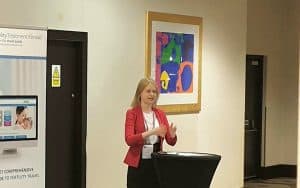12 July 2024
A groundbreaking study presented at the European Society of Human Reproduction and Embryology’s (ESHRE) 40th Annual Meeting in Amsterdam (7-10 July 2024) shows that exposure to air pollution can significantly decrease the chance of a live birth after IVF treatment by 38 percent. It found that air pollution’s negative impact on fertility starts before conception by disrupting egg development and quality. This adds to previous findings that microscopic soot particles travel through the bloodstream into the ovaries and placenta leading to increased miscarriage rates and premature births.
In this study, researchers analysed the impact of air pollution on 3,659 frozen embryo transfers involving 1,836 patients in Perth, Australia, over eight years. The study looked at exposure to air pollution (fine particulate matter) in the two weeks leading up to egg collection for IVF. The median female age was 34.5 years at egg retrieval retrieval and 36.1 years at frozen embryo transfer. The study found that women’s chances of achieving a live birth decreased by more than a third when exposed to the highest levels of air pollution before egg collection compared with women with the lowest air pollution exposure. The study also examined air pollution levels over four exposure periods prior to egg retrieval (24 hours, 2 weeks, 4 weeks, and 3 months) and found that exposure in the 3 months beforehand was also associated with decreased chances of live birth. (1) (3)
Lead author of the study, Dr Sebastian Leathersich, said “This is the first study that has used frozen embryo transfer cycles to separately analyse the effects of pollutant exposure during the development of eggs and around the time of embryo transfer and early pregnancy. We could therefore evaluate whether pollution was having an effect on the eggs themselves, or on the early stages of pregnancy.” (1)
According to the World Health Organization (WHO), air pollution is one of the greatest threats to human health and life, estimated to have caused 6.7 million deaths in 2019. Minute soot particles have been found to cross from the lungs into the bloodstream, reaching every organ and increasing the chances of developing heart disease, cancer and dementia as well. (2)
Dr Sebastian Leathersich said that “Pollution is harmful to almost all aspects of human health and it’s no surprise to me that reproductive health is also affected. I’m hopeful that these findings will help to highlight the urgency of the situation – that climate change poses a serious and immediate threat to human reproductive health, even at so-called safe levels”. (2)
Moving forward, Dr Sebastian Leathersich and colleagues intend to carry out further research to try and find out why pollution is so harmful to human health and reproduction and build on previous work which has demonstrated that fine particle matter can damage DNA and cause inflammation in tissues. (2)
The Value of Fertility & Family Law Expertise, Advisory & Consultancy
Given climate challenges, declining global fertility rates and socio-economic issues leading to delayed family building and later-life parenthood, it is more important than ever to maximise and protect individual fertility and pathways to parenthood.
Specialist fertility and family law strategies, advisory and consultancy helps inform effective approaches to (in)fertility and maximise reproductive health outcomes, as well as proactively manage family building arrangements. They identify and address a range of legal and practical issues and challenges associated with family creation and fertility treatment, putting family building and life on a firm foundation and maximising successful results. In doing so, this addresses:
- Legal issues and family building options due to impaired fertility including cancer diagnosis, unsuccessful conception, age-related fertility decline, change in gender, delayed parenthood (e.g. fertility preservation and maximisation, implications of using donor eggs and sperm and fertility treatment).
- Complex personal and family situations.
- Unexpected death of a loved-one and issues associated with posthumous storage and use of eggs, sperm and embryos in fertility treatment (e.g. due to an accident or illness).
- Legal issues and options associated with assisted conception involving a known donor, co-parent or identity-release or non-identifiable donor (e.g. legal parentage, parental rights, financial responsibility and dispute mitigation).
- Legal and wider aspects of international surrogacy or a UK surrogacy arrangement.
- Difficulties with storage and use of frozen eggs, sperm and embryos in fertility treatment in the UK (e.g. problems with consent).
- Issues with import of frozen gametes and embryos into the UK for use in fertility treatment and surrogacy (e.g. due to anonymous and commercially obtained gametes and embryos engaging UK public policy restrictions).
- Issues with the export of frozen gametes and embryos abroad for use in fertility treatment and surrogacy (e.g. consent and storage term difficulties).
- Legal and biological parentage issues and disputes (e.g. concerning DNA testing, direct-to-consumer genetic testing, rectification of birth certificate, declaration of parentage, step-parent adoption, recognition of overseas adoption, parental order).
- Care and upbringing of children following a dispute with an ex-partner, parent, donor or surrogate (e.g. contact, residence, financial arrangements, parental responsibility, specific issue or prohibited steps).
- Expert witness fertility, surrogacy and donor conception law services.
If you need to put in place effective legal and practical strategies or require advisory and consultancy to navigate fertility and pre-conception, assisted reproductive technologies, fertility treatment, global family building and effective parenting contact Louisa Ghevaert by email louisa@louisaghevaertassociates.co.uk or telephone +44 (0)20 7965 8399.
Images: Louisa Ghevaert, CEO & Founder Louisa Ghevaert Associates
Footnotes
- Air pollution linked to a decrease in IVF birth rate success, new study shows, European Society of Human Reproduction and Embryology, embargoed until 8 July 2024, https://www.eshre.eu/ESHRE2024/Media/2024-Press-releases/Leathersich.
- Hanna Devlin, Air pollution can decrease odds of live birth after IVF by 38% study finds, the Guardian, 7 July 2024, https://www.theguardian.com/science/article/2024/jul/07/air-pollution-live-birth-ivf-fertility-study.
- Leathersich S.J, et al (2024). Particulate matter (PM2.5 and PM10) exposure prior to oocyte collection is associated with decreased live birth rates in subsequent frozen embryo transfers. Human Reproduction.







